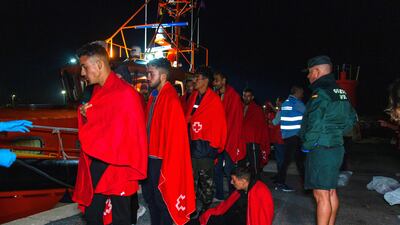The European Union's 27 member states on Wednesday reached a deal on sharing out the task of caring for refugees and migrants in crisis situations.
"With today’s agreement, we are now in a better position to reach an agreement on the entire asylum and migration pact with the European Parliament by the end of this semester," said Fernando Grande-Marlaska Gomez, acting Spanish Minister for Home Affairs.
The new law gives more flexibility and time to countries to process asylum applications when numbers are exceptionally high. This includes the weaponisation of migrants to destabilise the bloc, which last happened in 2021 with a surge of arrivals of mostly Iraqi migrants via Belarus.
Maria Malmer Stenergard, Sweden's Minister for Migration and Asylum Policy, said she was "very happy" with the agreement, which is "an important puzzle in the migration and asylum pact."
The European council, commission and parliament will continue negotiations in the hope of agreeing on the migration pact, which was first proposed by the commission in 2020, before the next European elections in June.
The crisis regulation allows EU countries to take exceptional measures, including asking for solidarity contributions from other countries.
This includes financial contributions, the relocation of asylum seekers or the examination of asylum claims.
Discussions on mandatory solidarity has caused frictions in the past within the bloc, with some Eastern European countries refusing to take in asylum seekers who mostly arrive via Mediterranean countries.
Attention has also recently focused on negotiating with countries of departures and transit. The commission's vice president Margaritis Schinas told lawmakers that he travelled last week to the Ivory Coast, Senegal and Guinea, and would go next with to Mauritania and Gambia.
"We are working with these countries to make sure that they understand that they have much more to benefit from the EU by working with us than rather [than] against us," he told lawmakers in Strasbourg during a debate.
Finalising the migration and asylum package is at the top of the EU's agenda as arrivals keep increasing.
Biggest number
Figures published last month by the European Union Agency for Asylum show that the EU is on track to receive more than one million asylum seekers this year – the biggest number since 2015 and 2016 when it saw a huge influx, mainly Syrians fleeing the war in their country.
Since the beginning of its mandate in 2019, the commission has been working both as an "architect and a firefighter," Mr Schinas said.
"Architects of a new regulatory framework that would ... connect all the dots of a missing migration and asylum policy, and at the same time as firefighters, being obliged to cope with an endless series and sequence of crises both at our external borders and at other parts of our territory," he said.
"We need the pact and we need it now," he said. "How long can we live in a house half-built?"
Mr Schinas said that nearly 127,000 people had reached the EU so far via the central Mediterranean route, a figure which has "almost doubled" since the same period last year.
But questions remain among lawmakers about how effective and humane the migration pact will be.
German MEP Hannah Neumann, a member of the greens group, told The National that she was "deeply concerned about the framing and the language" of the package.
"What I am missing in this whole discussion is the question of how people can legally enter the EU," she said.
Visas to enter the bloc are notoriously hard to obtain, both for people in search of work and for people facing repression at home, including human rights defenders.
"At the moment, we punish and talk down on people because we say they are illegal migrants. But they don't have a legal way to enter," said Ms Neumann.










